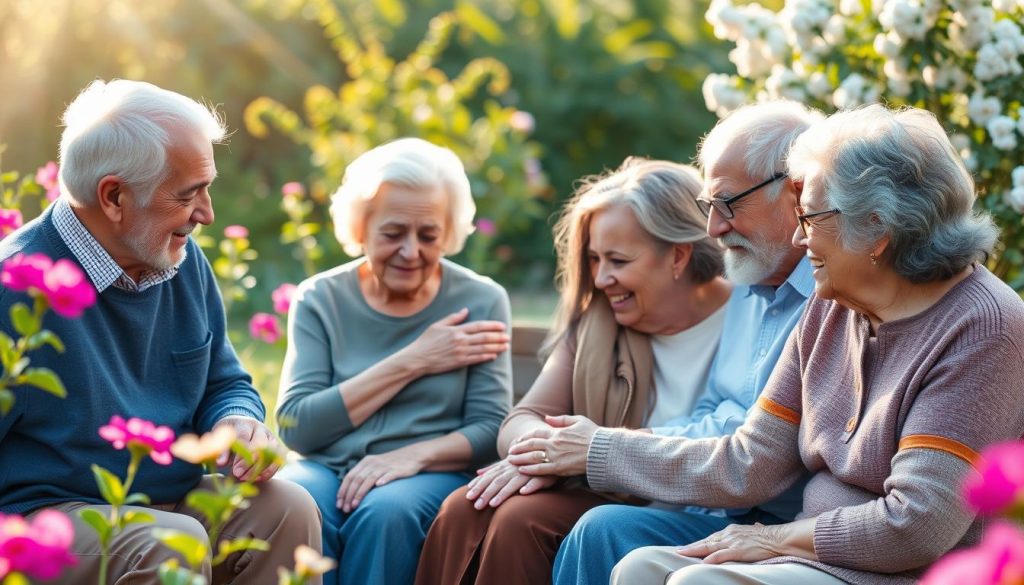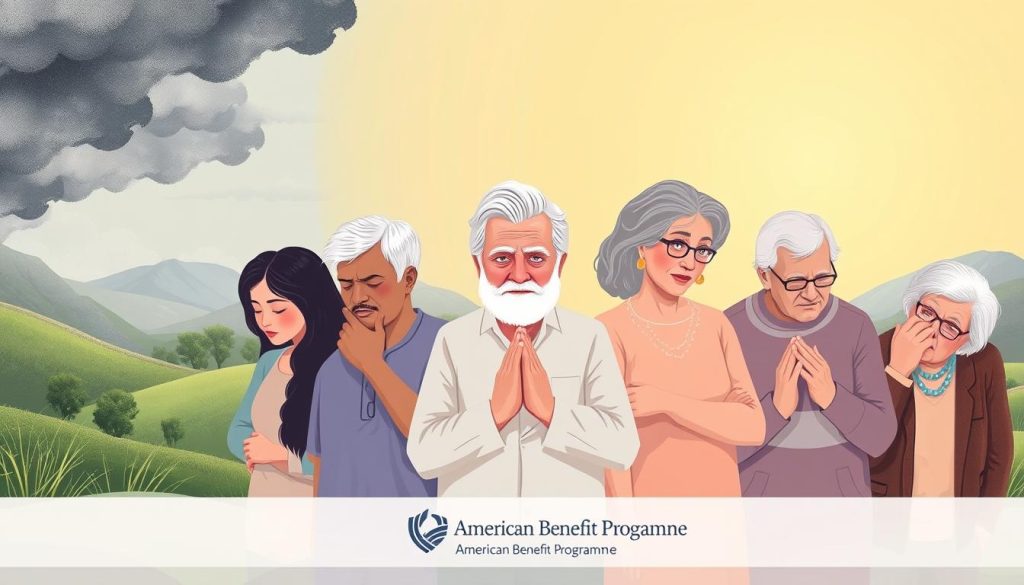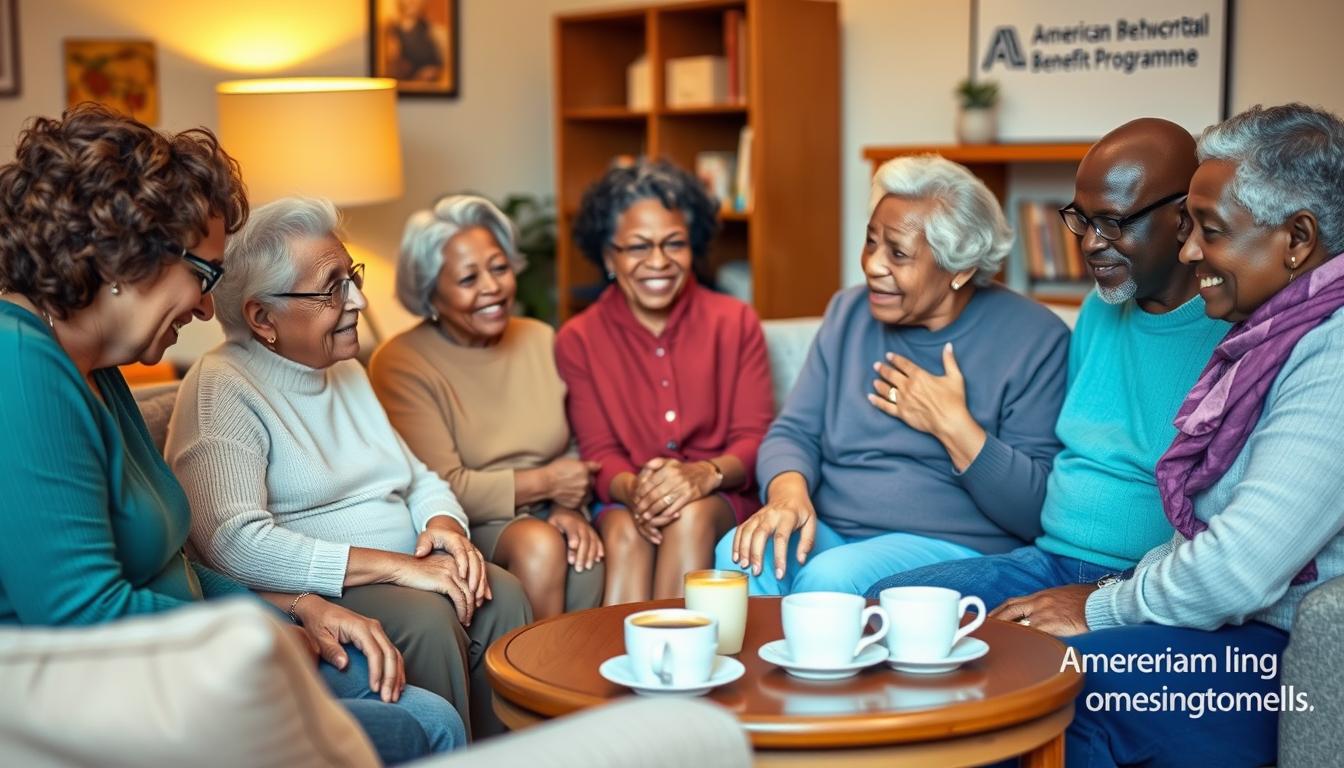How do we help our loved ones deal with deep sadness, especially in their later years? Elder grief support is key to understanding the unique struggles of grieving seniors. They need special care. The time it takes to grieve differs greatly. Some people might need a year, others just a few weeks1. Grief is a natural feeling. But for older people, it hits harder. This is often because they face many life changes like losing partners or health issues.
This guide shows how to aid their emotional health during these tough times. Studies show that grief can make heart rates go up and mess with sleep. This affects both mental and physical health1. We will look at ways to deal with loss, build strength, and give the support older adults need as they mourn.
Key Takeaways
- Elder grief support addresses the unique challenges faced by grieving seniors.
- Emotional support is crucial for coping with loss in later life.
- The grieving process can last from weeks to over a year.
- Understanding how grief impacts mental and physical health can aid in providing support.
- Communication and connection within families are essential during times of grief.
- Support groups can offer valuable resources and community for grieving individuals.
Understanding Grief in Seniors
Seniors deal with grief in their own way, and it’s important to understand this. They face many losses as they grow older. This affects how they feel and grieve. Knowing about these challenges helps us support them better.
The Unique Challenges of Grieving Seniors
Grieving seniors might feel very lonely and isolated. As friends pass away, they have fewer people around them. This can make them feel very sad and alone. They often deal with many losses over time, making things harder. About 10% of them feel a deeper, lasting sorrow2. This kind of deep sadness is more common in seniors than in younger people2.
Factors Influencing Grief in Older Adults
How old a person is can affect their grief. Those between 75 and 84 years old have a tougher time2. They may feel very anxious or extremely sad2. Things like stress from caring for others and not having much money play a big role too2. It’s important for doctors to spot these issues early. This way, they can help seniors cope better with their grief.
What is Elder Grief Support?
Elder grief support helps seniors deal with the tough times of loss. It comes in many forms. This is because older adults have different needs when they’re sad. They look for support services that understand what they’re going through.
Defining Grief Support Services
Grief support services offer a range of help for grieving seniors. They include:
- Individual counseling
- Support groups specifically for seniors
- Online platforms for remote assistance
- Hospice and palliative care offerings
These services are very important. They help seniors get through their sadness in a good way.
Benefits of Grief Support for Seniors
Elder grief support has many benefits. It makes seniors feel less alone. And it helps them understand their feelings better.
Getting help can heal their hearts. It also teaches them how to deal with their sadness. Sharing stories with friends who have also lost someone creates a special bond.
Research shows that being very sad can make seniors feel sick, both in mind and body3. It’s very important to lean on family, friends, and professionals during these hard times4.

Coping with Loss: Healthy Mechanisms
Dealing with loss is hard, especially for seniors. Using effective coping ways is key. These include self-care, being active, and using creativity in grief.
Self-Care Practices for Emotional Well-being
Self-care is crucial for mental health. Seniors should sleep well and eat healthy foods. Enjoying fun activities also helps.
Self-care reduces hopelessness that comes with loss5. Talking with loved ones also helps.
Physical Activity and Mindfulness Techniques
Exercises and staying active have big benefits. They make you feel better and less stressed. Mindfulness, like meditation or yoga, helps in dealing with grief6. Always check with doctors about which exercises are safe.
Creative Expression through Art or Music Therapy
Art or music therapy is great for expressing feelings. It helps in healing. Look for local classes or groups.
The Common Stages of Grief
Knowing the stages of grief helps us support others better. Grieving can be hard, especially for seniors who have lost someone. Each stage has different challenges.
People don’t always go through these stages in order. They might go back and forth between feelings. This can depend on their own experiences.
Denial, Anger, Bargaining, Depression, and Acceptance
Elizabeth Kübler-Ross named five stages in 19697. They start with denial, where seniors might feel shocked. Then anger might come, where they feel upset. This can be anger at themselves or others8.
Bargaining is when people try to find ways to deal with their loss. Then comes depression as they face their sorrow8. Acceptance is the last stage. It means starting to move on after acknowledging the loss7.
Understanding Each Stage’s Impact on Seniors
The stages of grief hit seniors hard. Many feel shock and denial first9. Anger can last for a long time, causing lots of frustration9. Depression is also common as they deal with their loss9.
Many seniors reach acceptance, but it’s different for everyone7. Being lonely or isolated can make grieving even harder9.

| Grief Stage | Common Reactions | Impact on Seniors |
|---|---|---|
| Denial | Refusal to accept the loss | May lead to feelings of isolation |
| Anger | Frustration and pain | Can manifest as bitterness, affecting relationships |
| Bargaining | Seeking ways to reverse the loss | Attempts to regain control, may lead to feelings of hopelessness |
| Depression | Helpers recognize feelings of despair | Common during acceptance; can lead to social withdrawal |
| Acceptance | Finding peace with the loss | Can foster new connections and opportunities for healing |
Elder Grief Support Resources
Grief can be hard to handle alone, but many resources help seniors during this time. They can find local groups, online help, and services in their community to heal. Here are some helpful options for those looking for support and guidance.
Finding Local Support Groups
Local groups offer seniors a way to connect with others who feel the same. These groups often meet for eight weeks, usually in Spring and Fall. The San Francisco Grief Support Group meets on Wednesdays from 6:00 to 8:00 pm. It’s for seniors who are dealing with loss10. By joining, they find a place to share stories and make new friends who understand.
Online Resources for Grieving Seniors
Some seniors may like to find support without leaving home. The internet has many tools and sites to help them cope. For example, the AARP offers special online resources for dealing with grief11. Users can read articles, watch videos, and talk to others online. This way, they get help and information without needing to travel anywhere.
Community Services Available
Services in the community, like those from hospice, are important for support. They help not just the person in grief, but their family too. The National Institute on Aging has tips on handling the loss of a partner11. For quick help, seniors can call local services, like 415-449-3700, to find out what’s available.
Encouraging Open Communication
Open communication is very important when seniors and their families grieve. It lets people share their feelings. This sharing helps healing by creating a caring space.
When people talk about their grief, it can make them feel better. Especially when losing someone makes talking hard. Sharing helps everyone feel closer and supports emotional health.
The Importance of Sharing Feelings
When seniors talk about their sadness, it lightens their load. It makes a place for them to share feelings of sadness or loneliness. Feeling safe to talk openly leads to better health.
Good communication stops misunderstandings and mistakes caused by stress and too much to think about12. Talking helps seniors share what they’re going through. This can be through everyday chats or planned talks.
Alternative Methods of Communication
Some may not like talking about their feelings. For them, writing or voice messages can help. These ways let them express themselves and connect with others.
Different ways to communicate help seniors who feel lost or alone because of bad health or being isolated. Having casual meet-ups or using community centers can make it easier for them to open up13.
Recognizing When Professional Help is Needed
Grief can be very hard, especially for older adults dealing with big losses. It’s key to know when to seek expert help for grief. Sometimes, people don’t see when their grief gets too hard and they need extra support.
Signs That Grief May Be Complicated
It’s important for older adults and their families to notice hard grief. Some signs of grief issues are:
- Sadness that goes on for more than six months.
- Feeling helpless, making daily tasks hard.
- Being very angry or hostile, which could cause harm.
- Having a tough time accepting change and moving forward.
About 10-20% of people mourning may have long and hard grief, needing expert help14. Research shows that 30-40% of mourners have a hard time getting back to daily life, which suggests they might need counseling14. Also, 15-30% of those grieving feel a lot of anger and hostility, needing help14. Around 25-35% struggle with accepting changes and moving on after loss14.
Types of Professional Support Available
There are many ways to get professional help for grief that aid seniors in healing. Knowing the types of support helps families choose wisely:
- Grief Counseling: One-on-one talks with a grief expert.
- Support Groups: Groups where people share stories and how they cope.
- Online Resources: Many books and articles on grief, with lots to find on Amazon15.
- Workshops and Retreats: Programs offering deep support and coping methods.
More people are looking for these resources, showing we’re getting better at dealing with grief15.
Ways to Support a Loved One Who is Grieving
Helping seniors who are grieving means knowing their needs. We should offer emotional and hands-on help. Being there to listen is very important. It helps in their healing. In talking with them, we let them share feelings. This makes a safe place for them. Grief touches everyone in its way. It depends on the person’s bond with the one they lost16.
Active Listening Strategies
We can build trust with grieving seniors by really listening. Here’s how we can do it:
- Be present: Show you are listening with eye contact and the way you sit or stand.
- Acknowledge feelings: Let them know you hear their pain. Often, just being there is enough.
- Encourage expression: Ask them to talk about the person they miss. This can help them heal17.
Providing Practical Support and Resources
Helping with everyday things can make a big difference for grieving seniors. Things you can do include:
- Daily Assistance: Offering to clean, shop, or cook can help a lot. It keeps them from feeling too stressed.
- Encouraging Community Engagement: Suggesting groups or counseling can help them feel connected. These are key for getting better18.
- Being Available: Just being around can make them feel less alone. It gives them a sense of family17.
By listening well and giving practical help, we make a caring space for those who are grieving. Staying close to them is key as they go through this tough time. It makes sure they and their caregivers get the support needed16.
Conclusion
Grieving is very personal, especially for older people. They face their own set of challenges when dealing with loss19. By 2060, nearly 100 million will be older adults. It’s critical to understand how to support them. They need help to heal emotionally and deal with different types of loss.
Support can come from family, friends, or professionals. It helps seniors work through their grief. This way, they can start to feel normal again in their lives.
Seniors should be kind to themselves during grief20. Feeling many emotions is normal. About 10% of people over 60 have lost an adult child. This shows the big need for support that meets their needs19.
Joining grief support groups can really help21. These groups bring people together. They help each other become stronger.
It’s okay to ask for help during hard times21. This can lead to better ways of coping and a happier life. Let’s make mental health a priority all the time. This way, we can offer better support to seniors in grief.
Source Links
- Navigating Grief Together: A Guide for Families Post-Loss | Resort Lifestyle Communities
- Bereavement in the elderly: the role of primary care
- How Grief Counseling Can Help Older Adults After the Loss of a Spouse or Partner – Institute on Aging
- Older People Grieve Differently | Center for Grief and Trauma Therapy
- Coping With Grief and Loss
- Coping with Grief and Loss in Later Life: How Therapy Can Help Seniors Navigate Life Transitions – Commonpoint
- The Stages of Grief: How to Understand Your Feelings
- 5 Stages Of Grief And Loss + Coping Tips For The Elderly
- Stages of Grief in Seniors – Blue Moon Senior Counseling
- Grief Support Groups Help Seniors Heal and Remember, “I’m not alone”
- NBCC | National Board for Certified Counselors & Affiliates
- Talking With Your Older Patients
- Tips For Helping Seniors Cope With Grief – Leading Edge Senior Care
- Knowing When Professional Grief Counseling is Necessary – Salus Homecare
- Perspectives on grief and loss
- Grief and Bereavement Resources and Services – Michigan 2-1-1
- 5 ways to support grieving friends, family when you’re not sure how – HOC Navigators
- HUG | Grief Support for Seniors: Understanding, Coping, and Finding Support | Blog
- Review of Grief Therapies for Older Adults
- Grief In The Elderly | Understanding Loss in Later Life

Leave a Reply